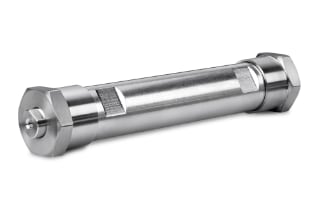
|
Chemistry |
C18 |
|
Separation Mode |
Reversed Phase |
|
Particle Substrate |
Silica |
|
pH Range Min |
2 pH |
|
pH Range Max |
8 pH |
|
Temperature Limits |
45 C |
|
Maximum Pressure |
6000 psi (415 Bar) |
|
Endcapped |
Yes |
|
Bonding Technology |
T3 |
|
Silanol Activity |
Medium |
|
Particle Shape |
Spherical |
|
Particle Size |
5 µm |
|
Endfitting Type |
Waters |
|
Pore Size |
100 Å |
|
Format |
OBD Prep Column |
|
Surface Area |
330 |
|
System |
HPLC Preparative |
|
Technique |
LC, LC/MS |
|
USP Classification |
L1 |
|
Inner Diameter |
19 mm |
|
Length |
150 mm |
|
Carbon Load |
14 % |
|
UNSPSC |
41115709 |
|
Brand |
Atlantis |
|
Product Type |
Preparative Columns |
|
Units per Package |
1 pk |
Atlantis T3 OBD Prep Column, 100Å, 5 µm, 19 mm X 150 mm, 1/pk
The Atlantis T3 OBD Prep Column is an excellent choice for adding to your lab equipment as it is a universal, silica-based, reversed-phase C18 column that provides balanced retention of polar and hydrophobic molecules and should be your first choice when developing separations of polar and non-polar compounds.
Using the Atlantis T3 OBD Prep Column, you can get superior performance across a wide pH range (2-8). The lab equipment is a crucial column in any lab as it has been designed to provide longer lifetimes at low pH. It also offers improved peak shape for amine-containing bases at pH 7.
An advanced T3 bonding process that uses a trifunctional C18 alkyl phase bonded at a ligand density that promotes polar compound retention and aqueous mobile phase compatibility is used in the manufacturing of the Atlantis T3 OBD Prep Column. When compared to the traditional trimethyl silane (TMS) end-capping, the proprietary T3 end-capping process is much more effective. When the unique end-capping is combined with T3 bonding, it results in superior polar compound retention and aqueous compatibility. It also offers enhanced column performance, lifetime, peak shape, and stability.
In addition to the features described above, the Atlantis T3 OBD Prep Column is an excellent alternative to traditional C18 reversed-phase LC columns. This is because it offers good retention of and selectivity for neutral, hydrophobic compounds in addition to polar analytes and superior performance over a wider pH range.
To know more about the T3 technology used in the Atlantis T3 OBD Prep Column, read through our website that contains detailed literature. Using the online store on the website, you can also shop for lab equipment and find all equipment necessary for chromatographic analysis.
We recommend that you also invest in the Atlantis T3 Prep Guard Cartridge, 100Å, 5 µm, 19 mm X 10 mm, 1/pk to protect your prep column and ensure its long lifetime by attaching to the column and removing any chemical and particulate contaminants from the mobile phase.
What Pressure Can The Atlantis T3 OBD Prep Column Tolerate?
The Atlantis T3 OBD Prep Column has been designed to withstand pressures of up to 6,000 psi (400 Bar or 40 Mpa). However, it is recommended that the column be used within the pressure range of 4,000 - 5,000 psi in order to maximize the column’s performance and lifetime. This will also lower the risk of system shutdowns and leakages.